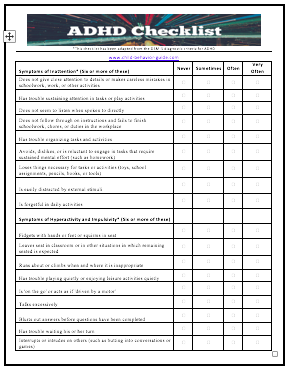As a parent or caregiver, it is important to be aware of the signs and symptoms of ADHD in children. Identifying ADHD in children early can lead to better treatment and management of symptoms, and ultimately improve their quality of life. This ADHD checklist can serve as a helpful tool in identifying potential symptoms of ADHD in children.
Hyperactivity
One of the classic symptoms of ADHD is hyperactivity. Children with ADHD may exhibit fidgeting, restlessness, and have difficulty sitting still. They may also be constantly moving and running around, even in inappropriate situations.
 If you notice your child displaying these behaviors, it may be worth discussing with their healthcare provider to determine if a diagnosis of ADHD may be appropriate.
If you notice your child displaying these behaviors, it may be worth discussing with their healthcare provider to determine if a diagnosis of ADHD may be appropriate.
Inattention
In addition to hyperactivity, children with ADHD may exhibit inattention. This can manifest in a variety of ways, including difficulty paying attention or staying focused, forgetfulness, and losing track of tasks or activities.
 If you notice your child struggling to pay attention or stay focused, it may be worth discussing with their healthcare provider to determine if a diagnosis of ADHD may be appropriate.
If you notice your child struggling to pay attention or stay focused, it may be worth discussing with their healthcare provider to determine if a diagnosis of ADHD may be appropriate.
Impulsivity
Another common symptom of ADHD in children is impulsivity. Children with ADHD may act without thinking, interrupt others, and have difficulty taking turns or waiting for their turn. They may also engage in risk-taking behaviors without considering the potential consequences.
 If you notice your child displaying impulsive behaviors on a regular basis, it may be worth discussing with their healthcare provider to determine if a diagnosis of ADHD may be appropriate.
If you notice your child displaying impulsive behaviors on a regular basis, it may be worth discussing with their healthcare provider to determine if a diagnosis of ADHD may be appropriate.
Difficulty with Organization
Children with ADHD may also struggle with organization. They may have difficulty keeping track of their belongings or keeping their workspace tidy. They may also struggle with following through on tasks or completing assignments.
 If you notice your child struggling with organization, it may be worth discussing with their healthcare provider to determine if a diagnosis of ADHD may be appropriate.
If you notice your child struggling with organization, it may be worth discussing with their healthcare provider to determine if a diagnosis of ADHD may be appropriate.
Difficulty with Social Relationships
Children with ADHD may also struggle with social relationships. They may have difficulty making and maintaining friendships, and may struggle with social cues or appropriate behavior in social situations.
 If you notice your child struggling with social relationships, it may be worth discussing with their healthcare provider to determine if a diagnosis of ADHD may be appropriate.
If you notice your child struggling with social relationships, it may be worth discussing with their healthcare provider to determine if a diagnosis of ADHD may be appropriate.
Treatment Options
If your child is diagnosed with ADHD, there are a variety of treatment options available. These may include medication, behavioral therapy, and lifestyle changes. It is important to work closely with your healthcare provider to determine the best course of treatment for your child.
 With proper treatment and management, children with ADHD can lead happy, successful lives.
With proper treatment and management, children with ADHD can lead happy, successful lives.
In summary, the signs and symptoms of ADHD in children can include hyperactivity, inattention, impulsivity, difficulty with organization, and difficulty with social relationships. If you notice these symptoms in your child, it may be worth discussing with their healthcare provider to determine if a diagnosis of ADHD may be appropriate. Treatment options for ADHD include medication, behavioral therapy, and lifestyle changes, and it is important to work closely with your healthcare provider to determine the best course of treatment for your child.